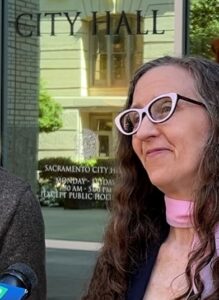 If you live in the City of Sacramento, please call and/or email your councilmember (using this look-up tool if needed) and ideally the mayor as well, by close of business this Monday, July 22, urging them to finalize and submit a badly needed, revamped business operations tax (BOT) ballot measure for the fall election by the August 9, 2024 submission deadline, to contain only:
If you live in the City of Sacramento, please call and/or email your councilmember (using this look-up tool if needed) and ideally the mayor as well, by close of business this Monday, July 22, urging them to finalize and submit a badly needed, revamped business operations tax (BOT) ballot measure for the fall election by the August 9, 2024 submission deadline, to contain only:
- The non-controversial tax cap increase on big businesses like Wal-Mart that was in the March BOT ballot measure, Measure C; and
- The simple, income-sensitive provision peer jurisdiction Fresno has, which would allow self-employed, licensed professionals to opt into the gross receipts tax most other Sacramento businesses pay.
For more information, see below for the body of the press release about this that went out this morning.
Thank you for continuing to stand up for the little guy!
SACRAMENTO, CA – Sacramento City Council is at the tail end of a month-long recess, having so far failed to submit a “badly needed,” revamped business operations tax (BOT) ballot measure for this November’s general election by the August 9 submission deadline, after its “problematic” BOT measure, Measure C, failed in March, charged Sacramento attorney Tiffany Clark Tuesday.
“Vulnerable residents are coping with huge new fee hikes—whether they participate in park programs, start a home business or simply park downtown on Sundays—even while there is an obvious revenue measure the Council could submit for voter consideration this fall, rather than nearly two years from now (unless it holds an expensive special election),” the attorney added.
Clark is referring to a BOT measure Councilmember Lisa Kaplan has suggested repeatedly (e.g., on May 7, 2024 at 3:29:30), containing just “the non-controversial part of Measure C that raised the tax cap on big businesses, not the unpopular part that dramatically increased the already high flat taxes certain licensed professionals pay, regardless of their income,” said Clark.
“Such a BOT measure could easily pass, as even the Sacramento Metropolitan Chamber of Commerce remained neutral on Measure C, despite its tax cap increase on big businesses like Wal-Mart, presumably counting itself lucky to have the cap increase to only $125,000, when most of the City’s self-identified ‘peer jurisdictions’ have no tax cap at all,” the attorney noted.
“Indeed,” Clark added, “Such a measure could pass in a landslide, with the enthusiastic support of the very same licensed professionals who helped defeat Measure C, if it integrated one, simple, additional element that would dramatically increase fairness to this group.”
The “additional element” Clark is referring to is the option Sacramento’s peer jurisdiction Fresno already offers to self-employed, licensed professionals, which would enable them to opt in to the gross receipts tax that most other businesses in Sacramento pay, instead of a flat tax.
“This would increase fairness because flat taxes are regressive,” explained the attorney, “Since they do not take income into account.”
Sacramento’s flat taxes on certain licensed professionals scale only for years licensed, which does not always align with income, as, for example, with older, semi-retired professionals, licensed for many years but earning less with part-time work.
This means self-employed, licensed professionals in some cases must pay tax bills many times higher than those of other, similarly situated business owners.
For example, Clark revealed for 2023 she paid about 2x more in tax as a part-time, licensed professional than her full-time, non-licensed professional husband paid, even though she earned about 87x less than he did.
The attorney maintains that even while she was working to defeat Measure C, in large part because of how it doubled down on the already “uniquely regressive and unfair” flat taxes on licensed professionals like her, she always assumed the City would revamp the measure for a re-run in the fall, given the anticipated “ballooning budget deficits projected for years to come.”
Moreover, Clark explicitly called on the Council to do just that, both in her first and second letters to the City concerning Measure C, as well as in her public pronouncements regarding the measure (here for example).
In addition, after Measure C failed, the attorney reached out to multiple city officials, including the Mayor, to encourage a re-do in fall. In fact, as far back as April 10, she emailed her councilmember, Mayor Pro Tem Karina Talamantes’ chief of staff, but was told “Given that we will have a new Mayor and two new councilmembers, those are discussions for a future council.”
“I was stunned,” Clark said, explaining, “It is hard to imagine any new mayor or councilmember being anything other than grateful for a council taking advantage of the perfect opportunity to hand them a healthy, non-controversial revenue stream, especially with projected annual deficits looming.”
“While I do understand councilmembers being distracted with the difficult choices they faced in passing the FY 24/25 budget,” the attorney empathized, “They did manage to submit a library parcel tax measure on time, while a revamped BOT measure would have involved little more than a cut and paste of the non-controversial portion of a measure that had just run,” she said.
“I don’t think it is too late, even now, but the Council would have to act fast,” Clark said, adding, “So, I urge residents to call on their councilmembers to seize this fleeting opportunity to avoid even more painful fee hikes, in addition to likely service cuts and layoffs, going forward.”
